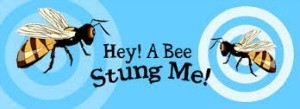
It is that time of year again, when parents are taking their kids to the park or the playground, just as the bees are enjoying their time there as well. At West Hartford we anticipate getting many inquiries from concerned parents about bee stings, about how to tell of their child is allergic and what to do about it if they are afraid their child is allergic to bees and happens to get stung.
With the majority of bee stings, one will only see minor reactions, such as itching, hives or rashes and soreness.
Treating a bee sting, when one is NOT allergic:
*remove the stinger
*apply a cold compress or ice
*treat with tylenol or NSAID
*apply topical ointment such as Neosporin to fight any possible infection, and possibly
*Caladryl, to combat itching
In the U.S., only 3% of all children stung by bees experience severe allergic reactions, however sometimes a child might be stung 2 or 3 times before having an allergic reaction. Especially if there is a family history of allergic reactions to bees, parents should always be prepared for an allergic reaction if a child is stung, as a severe allergic reaction can be life threatening. A severe bee sting reaction is known as anaphylaxis. If your child is stung and experiences any of the following sever reactions there is a good possibility that they are allergic to bees:
Symptoms of a possible allergic reaction to bee stings:
*throat closes
*difficulty breathing
*wheezing
*racing heart
*face or mouth swelling
*fever
What to do if your child experiences an allergic reaction to bees:
Immediately use an Epipen and call 911. They should be brought immediately to the emergency room and treated.


